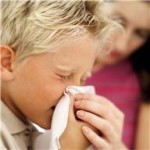Prevent the Flu, the Natural Way
Do you have fever for at least 3-4 days? Do you experience fatigue and body weakness all of a sudden? Or do you even have head ache? Well, if you have all of those symptoms, you may have the flu.
 The flu season here in the United States is common for no apparent reasons. It usually begins in the late fall and peaks in late winter. According to Flu F.A.C.T.S. (http://www.flufacts.com/know/season.jsp), flu-related deaths range from 3,300 to 48,600 (average 23,600).
The flu season here in the United States is common for no apparent reasons. It usually begins in the late fall and peaks in late winter. According to Flu F.A.C.T.S. (http://www.flufacts.com/know/season.jsp), flu-related deaths range from 3,300 to 48,600 (average 23,600).
Influenza or flu is a viral infection that affects the respiratory system of a person. It is contagious because it can be easily transmitted from one person to another via direct or indirect contact. Flu can be easily transmitted to children, older adults, and pregnant women, people who have chronic diseases such as diabetes and asthma and to those who are under stress.
The causative agent of flu is a virus. This virus travels through the air when someone talks or sneezes publicly. Influenza  virus can also be acquired through a contact to an inanimate object. For example, sharing a telephone with a flu infected person.
virus can also be acquired through a contact to an inanimate object. For example, sharing a telephone with a flu infected person.
If you do not have the flu yet, better take care of yourself to prevent it from coming. As the saying goes, “Prevention is better than cure.” Flu vaccinations have been widely available to the population but if you want to prevent flu in a more natural way, here are some methods which you can utilize:
Regularly wash your hands. It has already been proven through a lot of scientific studies that regular washing of hands have prevented a lot of diseases, including flu. Washing your hands at all times removes the microorganisms on your hands so that you cannot acquire them or pass it on to other people. According to flufacts.com, the influenza virus can live for 2-8 hours on surfaces and objects. Thus, it is important to wash your hands as often as you can.
Eat nutritious foods. Eat foods rich in vitamins and minerals such as fruits and vegetables. Always make it a point to include them in your meal plan especially the dark, green, red, yellow vegetables and fruits. Foods rich in phytochemicals are also beneficial in the body because they contain natural chemicals.
 Eating foods containing vitamin D is the best especially during winter season. Vitamin D is produced in the body during sunlight exposure. It helps boost the body’s immune system. And during winter season, the body cannot produce vitamin D. Eating foods rich in vitamin D helps combats contagious diseases by strengthening the immune system. Mackerel, salmon, sardines, cod liver oil and eggs are some of the vitamin D-containing foods. You can also take Vitamin D supplements but make sure they are organic.
Eating foods containing vitamin D is the best especially during winter season. Vitamin D is produced in the body during sunlight exposure. It helps boost the body’s immune system. And during winter season, the body cannot produce vitamin D. Eating foods rich in vitamin D helps combats contagious diseases by strengthening the immune system. Mackerel, salmon, sardines, cod liver oil and eggs are some of the vitamin D-containing foods. You can also take Vitamin D supplements but make sure they are organic.
Do aerobic exercises. Aerobic exercises improves the transport of oxygen to the different parts of the body by speeding up the heart to pump more blood, making the you breathe more and thus makes you breathe faster. In addition, aerobic exercises help increase the body’s virus-killing cells.
Sleep and rest. In every busy day, always make it a point to rest for at least 30 minutes and sleep for at least 8 hours. It is necessary to give yourself a break from all the stress and pressure on your daily activities. Sleep and rest allows your cells to regenerate from being used up for the entire day. Remember, when your body is under stress, your immune system gets compromised, therefore, making it easier for the microorganisms to invade your body and make you sick.
for at least 8 hours. It is necessary to give yourself a break from all the stress and pressure on your daily activities. Sleep and rest allows your cells to regenerate from being used up for the entire day. Remember, when your body is under stress, your immune system gets compromised, therefore, making it easier for the microorganisms to invade your body and make you sick.
Avoiding flu is not difficult when you stay healthy by following the tips mentioned above. Always keep in mind that prevention is better than cure. It applies in all kinds of diseases.
Written by Johanna Oosterwijk
